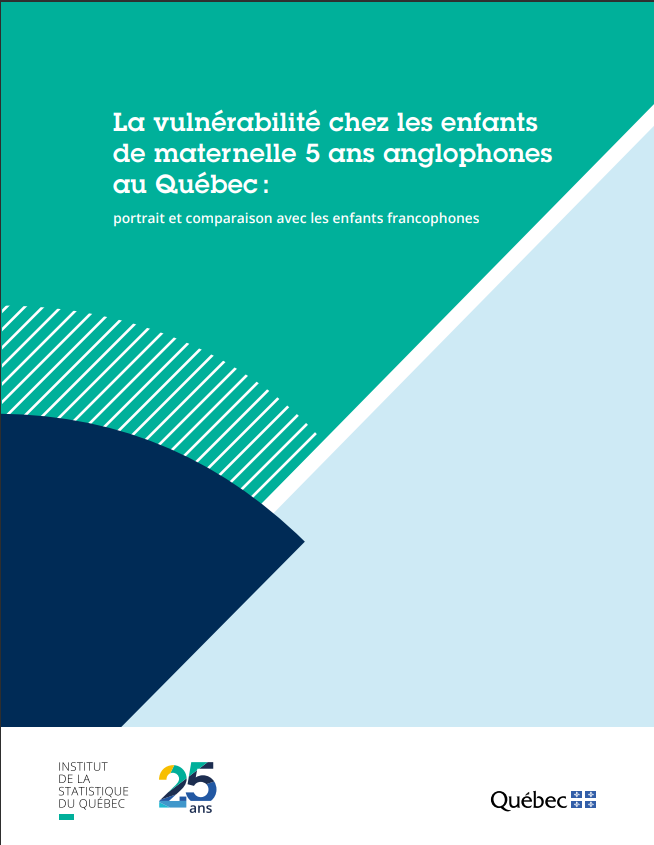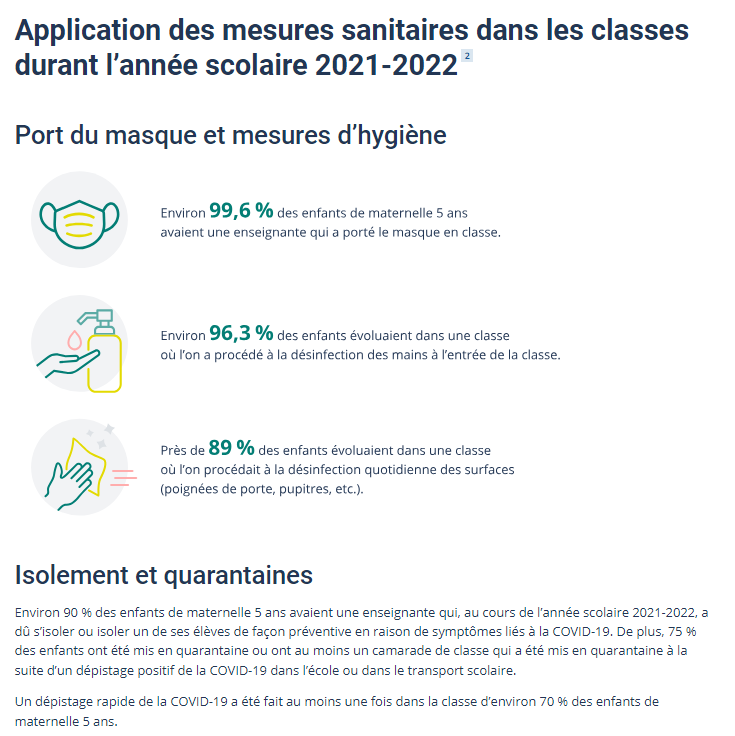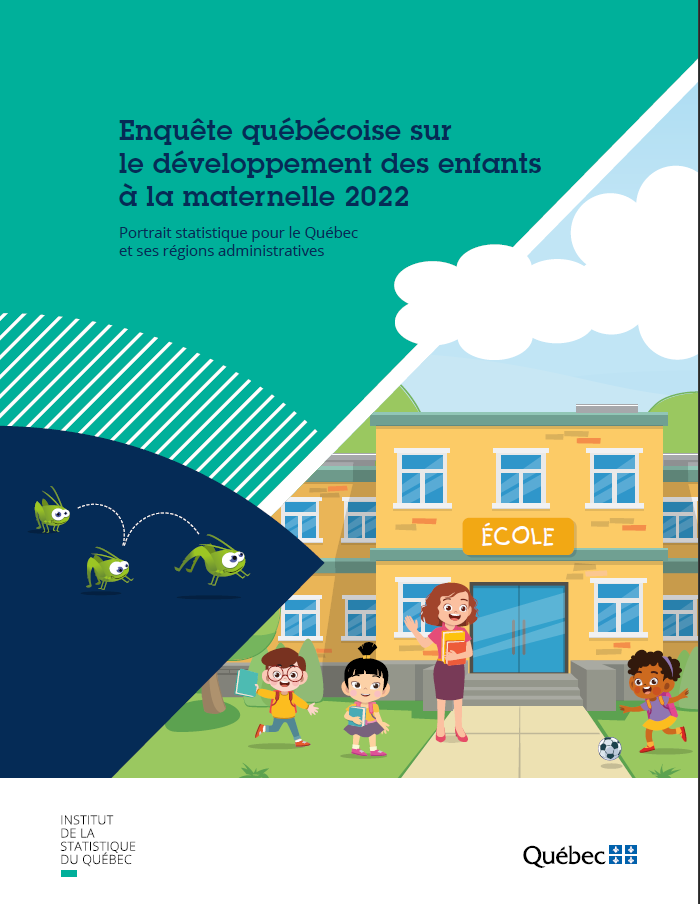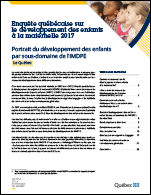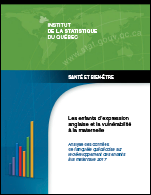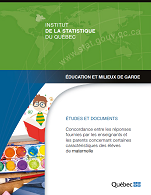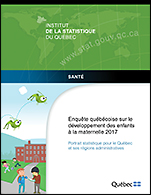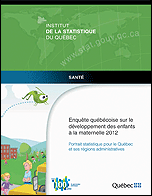Dans cette page :
General information
The QSCDK is carried out every five years since 2012. It is a census survey that aims to provide a picture of the development of children in 5-year-old kindergarten and to monitor changes over time. The Early Development Instrument (EDI) is used in this survey to measure child development. The EDI is a questionnaire filled out by teachers for each of the children in their class enrolled in 5-year-old kindergarten. It measures the skills of groups of children living in the same community or area in five developmental domains:
- Physical health and well-being
- Social competence
- Emotional maturity
- Language and cognitive development
- Communication skills and general knowledge
Type of survey
Cross-sectional survey; representative at the provincial and regional levels, and at the local level for certain results.
Targeted population
hildren enrolled full-time in kindergarten for 5-year-olds during the data collection period for the school year in question in French- and English-language schools in Québec, whether private or public (subsidized or unsubsidized).
The target population excludes children attending a school in the Cree and Kativik school boards or located in the Nunavik (17) and Terres-Cries-de-la-Baie-James (18) health regions. It also excludes children attending schools under federal jurisdiction.
Children in specialized schools and students with handicaps, social maladjustments or learning difficulties (SHSMLD) in special classes are also excluded from the survey. However, when SHSMLD students account for fewer than 50% of students in regular classes, they are included in the QSCDK for research purposes, but are excluded from the analyses produced by the Institut de la statistique du Québec and the calculation of vulnerability thresholds.
Sampling and data collection
Data collection period
2022: February to May 2022.
2017: February to May 2017.
2012: February to May 2012.
Response rates
Since 2017, the QSCDK is mandatory in accordance with the Act respecting the Institut de la statistique du Québec.
2022
Overall response rate: 92.3%
Ratio between the number of students for whom a questionnaire was completed and the total number of eligible students. This weighted overall rate accounts for all components of nonresponse related to school service centres and school boards, schools, teachers, and students.
School service centres and school boards: 70 participated / 70 eligible. Ratio between the number of students in participating school service centres and school boards and the total number of eligible students: 100%
Schools: 1,925 participated / 1,941 eligible. Ratio between the number of students in participating schools and the total number of eligible students: 99.5%
Teachers: 5,324 responded / 5,373 eligible. Ratio between the number of students in respondent classes and the total number of students in participating schools: 99.1%
Children: 80,587 questionnaires completed / 86,119 eligible children. Ratio between the number of students for whom a questionnaire was completed and the total number of students in respondent classes: 93.6%
2017
Overall response rate: 94.8%
Ratio between the number of students for whom a questionnaire was completed and the total number of eligible students. This weighted overall rate accounts for all components of nonresponse related to school boards, schools, teachers, and students.
School boards: 70 participated / 70 eligible. Ratio between the number of students in participating school boards and the total number of eligible students: 100%
Schools: 1,878 participated / 1,895 eligible. Ratio between the number of students in participating schools and the total number of eligible students: 99.7%
Teachers: 5,178 responded / 5,217 eligible. Ratio between the number of students in respondent classes and the total number of students in participating schools: 99.2%
Children: 83,335 questionnaires completed / 86,984 eligible children. Ratio between the number of students for whom a questionnaire was completed and the total number of students in participating classes: 95.8%
2012
Overall response rate: 81.3%
Ratio between the number of students for whom a questionnaire was completed and the total number of eligible students. This weighted overall rate accounts for all components of nonresponse related to school boards, schools, teachers, and students.
School boards: 69 participated / 70 eligible. Ratio between the number of students in participating school boards and the total number of eligible students: 99.3%
Schools: 1,647 participated / 1,859 eligible. Ratio between the number of students in participating schools and the total number of eligible students: 88.8%
Teachers: 3,969 responded / 4,133 eligible. Ratio between the number of students in respondent classes and the total number of students in participating schools: 95.9%
Survey promotion activities and the mobilization of our partners and their networks largely contributed to these excellent results.
Number of completed questionnaires
2022
80,587 questionnaires. Among the children for whom a questionnaire was completed, 2,556 were SHSMLDs (3.2%). Since these children are excluded from the results in the Institut de la statistique du Québec’s publications, the analyses cover 78,031 children.
2017
83,335 questionnaires. Among the children for whom a questionnaire was completed, 1,963 were SHSMLDs (2.4%). Since these children are excluded from the results in the Institut de la statistique du Québec’s publications, the analyses cover 81,372 children.
2012
64,989 questionnaires. Among the children for whom a questionnaire was completed, 1,902 were SHSMLDs (2.9%). Since these children are excluded from the results in the Institut de la statistique du Québec’s publications, the analyses cover 63,087 children.
Proportion of computerized and paper questionnaires
2022
Nearly all questionnaires were completed on the Institut de la statistique du Québec’s secure website. The rest were filled out on paper.
2017
Nearly all questionnaires were completed on the Institut de la statistique du Québec’s secure website. The rest were filled out on paper.
2012
About 95% of questionnaires were completed on the Institut de la statistique du Québec’s secure website. The rest were filled out on paper.
Complementary questionnaire on the teacher’s experience
2022
Response rate: 78.1%; representative at the provincial level only
Exploratory questionnaire that examines the links between child development and certain characteristics of the teacher, class, and school. It was administered to a sample that included about one third of 5-year-old kindergarten teachers.
Themes
Overall development and five domains of development:
- Physical health and well-being: motor skills, fatigue, physical readiness (adequate food and clothing), etc.
- Social competence: self-confidence, sense of responsibility, respect for peers, etc.
- Emotional maturity: hyperactivity, inattention, anxiety, sadness, etc.
- Language and cognitive development: interest and skills in reading and mathematics, etc.
- Communication skills and general knowledge: ability to enunciate clearly, ability to understand others, ability to communicate, etc.
Technical and methodological information
Microdata files are available at the Centre d’accès aux données de recherche de l’Institut de la statistique du Québec (CADRISQ).
Technical and methodological documentation (2022)
Technical and methodological documentation (2017)
Technical and methodological documentation (2012)
The survey is funded by:
- 2022: Ministère de la Santé et des Services sociaux, Ministère de l’Éducation, Ministère de la Famille, Lucie and André Chagnon Foundation, Institut de la statistique du Québec.
- 2017: Ministère de la Santé et des Services sociaux, Ministère de l’Éducation et de l’Enseignement supérieur, Ministère de la Famille, Avenir d’enfants, Institut de la statistique du Québec.
- 2012: Ministère de la Santé et des Services sociaux, Ministère de l’Éducation, du Loisir et du Sport, Ministère de la Famille, Avenir d’enfants, Institut de la statistique du Québec.

